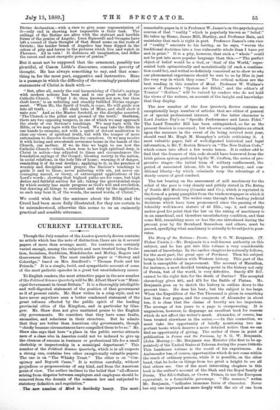CURRENT LITERATURE.
Though the July number of the London Quarterly Review contains no article which has the note of distinction, there are in it several papers of more than average merit. Its contents are certainly varied enough, among the subjects and men treated being Evolu- tion, Socialism, Buddhism, Mendelssohn and Motley, Rogers and Gouverneur Morris. The most readable paper is" Stowey and Coleridge," based on Mrs. Sandford's "Thomas Poole and his Friends." It is a simple, lucid, and sympathetic account of some of the most pathetic episodes in a great but unsatisfactory career.
To English readers, the most attractive paper in the new number of the Political Science Quarterly will be Mr. Albert Shaw's on "Muni- cipal Government in Great Britain." It is a thoroughly intelligible and well-digested statement of the position of that government as it at present exists. Mr. Shaw writes in a crisp style, and we have never anywhere seen a better condensed statement of the great reforms effected by the public spirit of the leading provincial cities of the Kingdom, and in particular by Glas- gow. Mr. Shaw does not give unstinted praise to the English city governments. He considers that they have some faults, anomalies, and solecisms in their structure. But he admits that they are better than American city governments, though "chiefly because circumstances have compelled them to be so." Mr. Shaw also says that here "a place in the public service attracts men of a class who in America could not be induced to give up the chances of success in business or professional life for a small clerkship or inspectorship in a municipal department." This number of the Political Science Quarterly, which is in all respects a strong one, contains two other exceptionally valuable papers. The one is on "The Whisky Trust." The other is on "Con- spiracy and Boycott Cases." It is written carefully, without prejudices or prepossessions of any kind, and from the American point of view. The author inclines to the belief that "all offences arising from disputes between employers and employees should be removed from the domain of the common law and subjected to statutory definition and regulation."
The new saunberf of Mini is decidedly heavy. The most
remarkable paper in it is Professor W. James's on the psychological sources of that " reality " which is popularly known as "belief." He takes up Hume, James Mill, Hartley, and Professor Bain, and maintains that each is right in part. Professor James's own view of "reality" amounts to his having, as he says, "woven the traditional doctrines into a less vulnerable whole than I have yet met in print." It is a pity, however, that such a " whole " could not be put into more popular language than this :—" The perfect object of belief would be a God, or Soul of the World,' repre- sented both optimistically and moralistically (if such a combina- tion could be), and withal so definitely conceived as to show us why our phenomenal experiences should be sent to us by Him in just the very way in which they come." The critical notices are the best reading in this number of Mind. Professor W. Wallace's review of Paulsen's "System der Ethik," and the editor's of 'Denies' "Hobbes," will be valued by readers who do not hold the views of the writers, on account of the insight and, knowledge that they display.


































 Previous page
Previous page